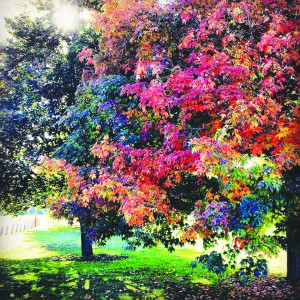Do you feel it? In the crumpled leaves that rattle and swirl over the pavement; in their satisfying crunch beneath your shoes. In rainy days that have you inexplicably pining for kindergarten, when leaves and puddles were not a niussance, but for jumping in.Fall is busy and wistful, ripe with a nostalgia for summer and times gone by. Permeating the crisp air is that unmistakable scent of leaves decomposing. 
“Everything passes, everything changes,” Bob Dylan croons in “To Ramona.” “Just do what you think you should do.”The NMU community gets to experience fall surrounded by incredible vistas in every direction. Alumnus, poet and playwright Jonathan Johnson, returning to NMU on Thursday, Oct. 17 for a poetry reading, said fall is the most beautiful of all the seasons.
“I just can’t wait to see some of my favorite trees in Marquette this time of year,” Johnson said.“[Fall] really teaches us all these lessons about renewal, about endurance, about how to be full and flourish and then how to die and let go,” Johnson said. “And how to be the most beautiful when you’re dying and letting go.”Death and transformation seem to pervade autumn in the sight and scent of leaves, but the process trees undergo as their leaves change color is complex.The fall leaves aren’t so much “turning color,” as “losing pigment,” said NMU biology graduate student Steven Caird, who is researching tree ecology on Isle Royale.
“As the season winds down, plants are repurposing the components of chlorophyll (the green pigment) into other more useful and seasonally appropriate molecules,” Caird said. “[Trees are] drawing their resources inward, because it’s no longer efficient to continue trying to harvest light.”Caird, a musician himself, said the process is like these lyrics by fiddler Kailin Young:
“Open your heart; open your mind. Let the sun shine through your eyes, so that you see the road before you when you’re traveling in the night.”Caird said he both dreads and loves that “night,” winter. 
“You just have to remember that the only thing different is that there’s less light, and you respond just as much as the leaves on the trees,” Caird said. “We, like they, have adapted to store the starch of summer in our roots to pull through ‘til next spring.”“Marquette is beautiful in its remoteness and difficulty as well as in its graces,” Johnson said. “I think there are few things in life to be that are better than being a young writer in Marquette.”
It is good to be a student of any kind in Marquette in the fall, going to school to learn and hack out a path to the foggy future. Autumn feels fleeting, so full of decisions too quickly passed. But that is OK. The trees are talking of endurance, beauty and letting go with more grace and complexity than one person can conceive of. That is all we’re promised in this life, and it is enough.





























